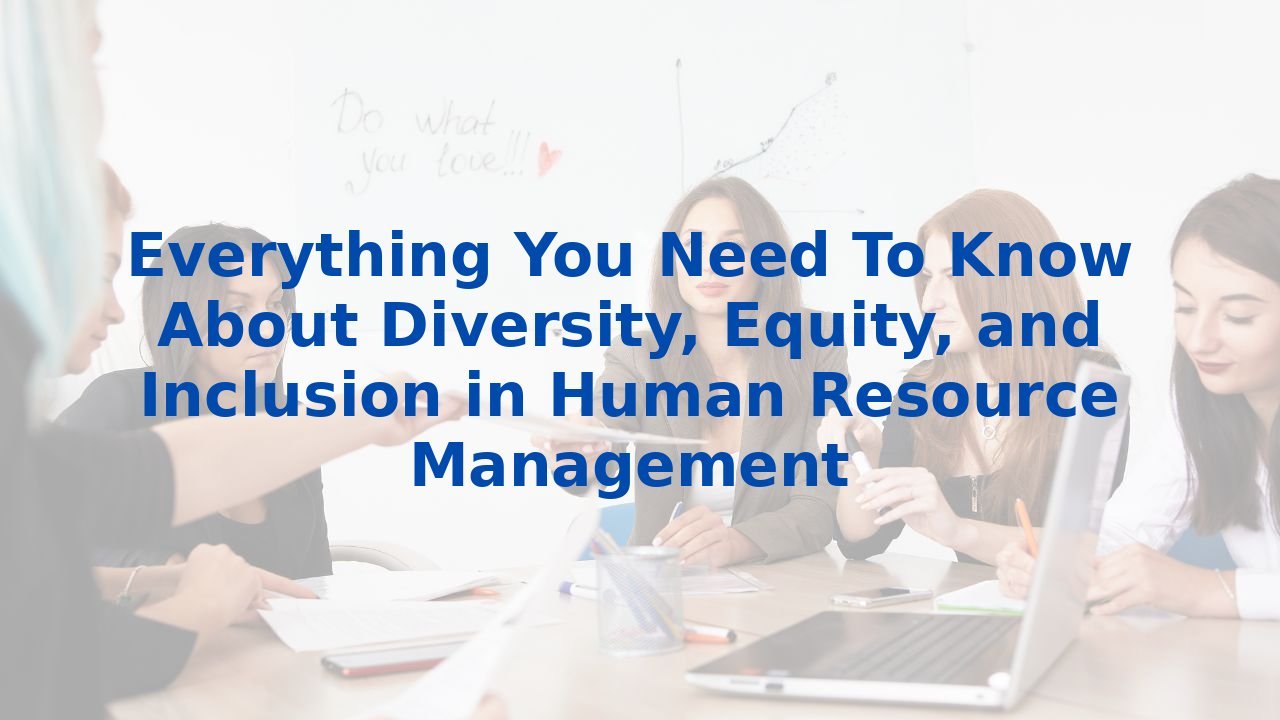Everything You Need To Know About Diversity, Equity, and Inclusion in Human Resource Management
The Importance of Diversity, Equity, and Inclusion in Human Resource Management
In today's dynamic corporate environment, the principles of diversity, equity, and inclusion (DEI) are more than just buzzwords; they are essential components of effective human resource management (HRM). Organizations that embrace and implement DEI initiatives will not only create a harmonious workplace but also unlock a vast pool of talent and innovation. As we delve into the significance of DEI in HRM, we’ll uncover how the integration of artificial intelligence (AI) can further enhance these efforts, driving efficiency and improving the overall employee experience.
Understanding DEI in HRM
Diversity refers to the variety within a workforce in terms of gender, ethnicity, age, sexual orientation, and more. Equity is about fairness in processes, practices, and opportunities. Inclusion ensures that all employees feel welcomed, valued, and empowered to contribute. Together, these elements foster a workplace culture that nurtures creativity and engagement.
In the context of HRM, establishing a DEI framework is vital. A diverse workforce is not only more innovative but also more reflective of the global marketplace. It allows an organization to connect better with its customers, thereby enhancing business performance. Equity ensures that everybody, regardless of their background, has a fair shot at career advancement. Inclusion cultivates a sense of belonging, which is crucial for employee satisfaction and retention.
AI: A Catalyst for Enhanced Diversity, Equity, and Inclusion
As organizations strive to implement DEI frameworks, they can leverage AI to optimize their HR processes. AI technologies can analyze recruitment practices, identify biases in job postings, and assist in creating more inclusive job descriptions. By utilizing data analytics, AI can help organizations understand the demographic composition of their workforce, monitor diversity metrics, and track progress over time.
Implementing AI-driven recruiting tools can streamline the hiring process, ensuring that candidates are evaluated on merit rather than unconscious biases. This helps organizations attract and retain diverse talent. AI algorithms can suggest candidates from underrepresented groups, thus contributing to a more balanced workforce.
Enhancing Efficiency in HR Processes
The integration of AI into HRM processes enhances overall efficiency. Traditional HR practices can be time-consuming and prone to human error. AI can automate repetitive tasks such as screening resumes, scheduling interviews, and conducting initial assessments. This automation allows HR professionals to focus on more strategic initiatives, such as employee development and engagement, rather than getting bogged down in administrative functions.
Moreover, AI’s ability to analyze vast amounts of data helps HR departments make informed decisions. By identifying trends and predicting outcomes, organizations can develop proactive strategies for retention, employee satisfaction, and performance evaluations. This data-driven approach creates a more agile HR function that responds effectively to changes within the workforce.
The Role of Employee Training in AI Adoption
While AI provides robust tools for enhancing DEI initiatives, organizations must recognize the importance of training their employees in AI-related skills. Training empowers employees to utilize these technologies effectively, fostering a culture of continuous learning and adaptability.
By investing in comprehensive AI training programs, organizations can build a workforce that is not only tech-savvy but also equipped to understand the ethical implications of AI in hiring and management practices. This creates a balanced synergy between human intuition and AI capabilities, ensuring that diversity and inclusion are prioritized throughout the recruitment and employee management processes.
Fostering an Inclusive Environment through Strategic HRM
As we navigate the complexities of today’s business landscape, the importance of diversity, equity, and inclusion in HRM cannot be overstated. Organizations must recognize that merely having a diverse workforce is not enough. They need to actively promote equity and create an inclusive environment where every employee feels valued and heard.
AI can serve as a powerful ally in this journey, facilitating the identification of barriers to participation, optimizing recruitment efforts, and providing data-driven insights for effective decision-making. When organizations harness AI to promote DEI, they not only enhance their internal culture but also position themselves to thrive in the global marketplace.
“The future of workplace culture is inclusive, shaped by the principles of diversity, equity, and inclusion, augmented by the power of AI.”
Ultimately, the confluence of human resource management, DEI principles, and AI technology promises a transformative era for organizations. By prioritizing these elements, companies will not only attract and retain top talent but also cultivate an environment where innovation and collaboration flourish.
For organizations interested in integrating AI into their HR practices, investing in comprehensive AI training for employees can set a strong foundation for success. Explore the pathway toward a more efficient, inclusive, and diverse workforce, and choose to prioritize these ideals in your organizational strategy.



